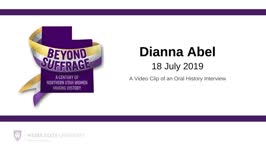| Title |
Abel, Dianna OH19_001 |
| Creator |
Weber State University, Stewart Library: Oral History Program. |
| Contributors |
Abel, Dianna, Interviewee; Harris, Kandice, Interviewer; Stokes, Alexis, Video Technician |
| Description |
The Beyond Suffrage Project was initiated to examine the impact women have had on northern Utah. Weber State University explored and documented women past and present who have influenced the history of the community, the development of education, and are bringing the area forward for the next generation. The project looked at how the 19th Amendment gave women a voice and representation, and was the catalyst for the way women became involved in the progress of the local area. The project examines the 50 years (1870-1920) before the amendment, the decades to follow and how women are making history today. |
| Abstract |
The following is an oral history interview with Dr. Dianna Abel, conducted on July 18, 2019 in her office, by Kandice Harris. Dianna discusses her life, her memories at Weber State University, and the impact of the 19th Amendment. Alexis Stokes, the video technician, is also present during this interview.; The following is a video clip of an oral history interview with Dr. Dianna Abel discussing the importance of 19th Amendment. |
| Subject |
Weber State University; Universities and colleges; Counseling in higher education; Women--suffrage; Voting--United States; Women college administrators |
| Keywords |
The 19th Amendment; Women's Suffrage; Mental Health; Therapy; Counseling |
| Digital Publisher |
Stewart Library, Weber State University, Ogden, Utah, United States of America |
| Date |
2019 |
| Date Digital |
2019 |
| Temporal Coverage |
1969; 1970; 1971; 1972; 1973; 1974; 1975; 1976; 1977; 1978; 1979; 1980; 1981; 1982; 1983; 1984; 1985; 1986; 1987; 1988; 1989; 1990; 1991; 1992; 1993; 1994; 1995; 1996; 1997; 1998; 1999; 2000; 2001; 2002; 2003; 2004; 2005; 2006; 2007; 2008; 2009; 2010; 2011; 2012; 2013; 2014; 2015; 2016; 2017; 2018; 2019 |
| Medium |
oral histories (literary genre) |
| Spatial Coverage |
Lynwood, Los Angeles, California, United States, http://sws.geonames.org/11788760, 33.92396, -118.20165; Salt Lake City, Salt Lake, Utah, United States, http://sws.geonames.org/5780993, 40.76078, -111.89105; Ogden, Weber County, Utah, United States, http://sws.geonames.org/11788968, 41.22809, -111.96766 |
| Type |
Text; Image/StillImage; Image/MovingImage |
| Access Extent |
PDF is 41 pages; Video Clip is an mp4, 38.6 MB |
| Conversion Specifications |
Filmed using a Sony HDR-CX430V digital video camera. Sound was recorded with a Sony ECM-AW3(T) bluetooth microphone. Transcribed using Express Scribe Transcription Software Pro 6.10 Copyright NCH Software. |
| Language |
eng |
| Rights |
Materials may be used for non-profit and educational purposes, please credit University Archives; Weber State University |
| Source |
Abel, Dianna OH19_001 Weber State University Archives |
| Format |
application/pdf; video/mp4 |
| ARK |
ark:/87278/s6qz5nr6 |
| Setname |
wsu_bs_oh |
| ID |
105413 |
| Reference URL |
https://digital.weber.edu/ark:/87278/s6qz5nr6 |
| Title |
Abel, Dianna OH19_001 |
| Creator |
Weber State University, Stewart Library: Oral History Program. |
| Contributors |
Abel, Dianna, Interviewee; Harris, Kandice, Interviewer; Stokes, Alexis, Video Technician |
| Description |
The Beyond Suffrage Project was initiated to examine the impact women have had on northern Utah. Weber State University explored and documented women past and present who have influenced the history of the community, the development of education, and are bringing the area forward for the next generation. The project looked at how the 19th Amendment gave women a voice and representation, and was the catalyst for the way women became involved in the progress of the local area. The project examines the 50 years (1870-1920) before the amendment, the decades to follow and how women are making history today. |
| Abstract |
The following is an oral history interview with Dr. Dianna Abel, conducted on July 18, 2019 in her office, by Kandice Harris. Dianna discusses her life, her memories at Weber State University, and the impact of the 19th Amendment. Alexis Stokes, the video technician, is also present during this interview. |
| Image Captions |
Dianna Abel Circa 2019 |
| Subject |
Weber State University; Universities and colleges; Counseling in higher education; Women--suffrage; Voting--United States; Women college admnistrators |
| Keywords |
The 19th Amendment; Women's Suffrage; Mental Health; Therapy; Counseling |
| Digital Publisher |
Stewart Library, Weber State University, Ogden, Utah, United States of America |
| Date Digital |
2019 |
| Temporal Coverage |
1969; 1970; 1971; 1972; 1973; 1974; 1975; 1976; 1977; 1978; 1979; 1980; 1981; 1982; 1983; 1984; 1985; 1986; 1987; 1988; 1989; 1990; 1991; 1992; 1993; 1994; 1995; 1996; 1997; 1998; 1999; 2000; 2001; 2002; 2003; 2004; 2005; 2006; 2007; 2008; 2009; 2010; 2011; 2012; 2013; 2014; 2015; 2016; 2017; 2018; 2019 |
| Medium |
oral histories (literary genre) |
| Spatial Coverage |
Lynwood, Los Angeles, California, United States, http://sws.geonames.org/11788760, 33.92396, -118.20165; Salt Lake City, Salt Lake, Utah, United States, http://sws.geonames.org/5780993, 40.76078, -111.89105; Ogden, Weber County, Utah, United States, http://sws.geonames.org/11788968, 41.22809, -111.96766 |
| Type |
Text; Image/StillImage |
| Access Extent |
PDF is 41 pages |
| Language |
eng |
| Rights |
Materials may be used for non-profit and educational purposes, please credit University Archives; Weber State University |
| Source |
Abel, Dianna OH19_001 Weber State University Archives |
| Format |
application/pdf |
| Setname |
wsu_bs_oh |
| ID |
105515 |
| Reference URL |
https://digital.weber.edu/ark:/87278/s6qz5nr6/105515 |





